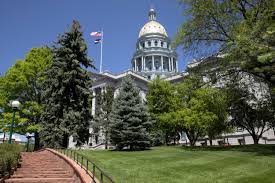Today, the Senate passed this year’s ‘Long Bill’ as well as a series of companion bills that comprise the totality of Colorado’s $34.6 billion state budget.
“Budgets are more than just line items in a spreadsheet, they are principled documents that reflect what we care about as a community,” said Senate President Leroy Garcia (D-Pueblo). “The responsibility of crafting such meaningful legislation is something we do not take lightly. This year’s budget is the result of five months of tireless, bipartisan work to revitalize the state after a devastating pandemic. I am grateful for the way in which we have worked across the aisle to invest critical funds into Colorado’s public school, healthcare services, and state infrastructure – putting our state on track to not only recover but build back stronger.”
After a tumultuous economic year, Colorado’s legislative leadership says the 2021-2022 state budget reflects “Colorado’s continued fiscal improvement, as well as the legislature’s commitment to build back stronger.”
“After months of uncertainty, I am exceedingly proud to introduce a budget that not only restores the heartbreaking cuts we were forced to make last year but uplifts hard-hit Coloradans and boldly invests in our state’s future,” said Chair of the Joint Budget Committee, Senator Dominick Moreno (D-Commerce City) on Thursday, as the budget was introduced to the state senate. “Colorado, like the rest of the world, has been through so much during this pandemic, so it is a relief to finally see the storm breaking. I’m confident that the funding package we put together this year will ensure Colorado has an equitable recovery and a resilient foundation.”
“We are not out of the woods yet,” he added, “and there are many challenges we have still to overcome, but I believe that we are well on our way towards a stronger, more resilient Colorado.”
“Budgets are moral documents – they show what we as a community value and prioritize – and this year, Colorado’s budget underscores not only the adversity we have overcome as a state but the ongoing commitment we have to build back stronger,” said Joint Budget Committee member Senator Chris Hansen (D-Denver). “From education to critical infrastructure, this year’s budget has made massive strides in responding to urgent needs of Colorado as well as promoting a rapid recovery. Overall I am excited about what we have been able to accomplish and look forward to Colorado’s long-awaited comeback.”
Colorado’s $34.6 billion budget includes funding for day-to-day operations of state government, the majority of which is allocated to six departments, known as the ‘Big Six’, which together receive approximately 80 percent of total state funding:
- Dept. of Health Care Policy & Financing
- Dept. of Education
- Dept. of Higher Education
- Dept. of Human Services
- Dept. of Corrections
- The Colorado Judicial Dept
Last year, as a result of the COVID-19 pandemic and subsequent economic recession, the state budget was forced to absorb a near $4 billion reduction in financial resources. Fortunately, as the state economy continues to improve, this year’s state budget is nearly back to pre-pandemic levels.
Highlights of restored funding:
$480.3 million to reduce the budget stabilization factor – bolstering school funding levels for the next two years. The “negative factor” gap in K-12 education funding is the amount by which state spending on schools falls short of the Amendment 23 formula – a persistent issue for Colorado due to TABOR restraints.
$473 million for state institutions of higher education. This will restore cuts made last year for students attending state institutions, stipends for qualified low-income students attending private institutions, and grants that support public institutions of higher education.
$380 million for future Public Employees’ Retirement Association Direct Distribution payments — This additional funding will ensure valued public servants like public school teachers, state troopers, university professors, and other employees have a pathway toward a comfortable retirement.
$124 million for 2021 transportation legislation — This allocation will help address Colorado’s growing transportation needs by restoring funds that were unavailable in 2020 due to more pressing fiscal needs arising from the pandemic.
$100 million to the State Education Fund — The State Education Fund is the primary funding source for teacher recruitment, full-day kindergarten, early literacy programs, and financing K-12 schools across the state.
Highlights of investments made in support of the most vulnerable Coloradans include:
$707.5 million for medical and long-term services and supports provided through Medicaid — This additional funding will go toward both critical care services (e.g. physician visits, prescription drugs, hospitalization) and long-term care services (e.g. nursing home care and community-based services).
$87 million for county administration of SNAP benefits — These funds will support the administration of the Supplemental Nutrition Assistance Program (SNAP) as well as a variety of smaller programs, including child support enforcement services and the Low-income Energy Assistance Program (LEAP).
$48.2 million for disproportionate share hospitals — This funding will provide additional support for hospitals that serve a disproportionate share of low-income patients.
$6.5 million to the Governor’s Office of eHealth Innovation (OeHI) for their Rural Connectivity project — This project will increase rural health providers’ access to health information, analytics, and technical support to improve the health and safety of rural communities.
$5.9 million to address health care disparities — These funds will go towards mitigating racial and ethnic health disparities present in Colorado.
$1.9 million to support Colorado’s implementation of the National School Lunch Program — The National School Lunch Program is a federally assisted meal program that provides nutritious, low-cost or free lunches to students each day.
$910,000 for behavioral health services for children in crisis — These funds support improved hotline, walk-in, and mobile crisis services for children and youth.
Highlights of investments made to enhance Colorado’s resiliency:
$327.1 million for state infrastructure and information technology projects — These projects will create new, good-paying jobs and revitalize communities around the state. Projects include the Colorado Mental Health Institute at Pueblo, the Community College of Denver’s Classroom and Conference Room Technology project, various highway construction projects, and Department of Natural Resources property acquisitions and improvements.
$201 million to fund the State Emergency Reserve — This newly created reserve fund will act as the State’s ‘rainy day fund’ to help provide a safety net and ensure resiliency for future declared states of emergency.
$50 million to fund 2021 legislative proposals — Current legislative priorities include transportation and infrastructure funding, policies to combat climate change, workforce development and job creation strategies, reducing the cost of healthcare premiums and prescription drugs, housing support, and initiatives to address teacher shortages.
$100 million to the Building Excellent Schools Today (BEST) Fund — The BEST fund is the vehicle for competitive grants to schools for the construction of new facilities as well as general maintenance and renovation of existing school systems and structures.
$13.2 million for the Wildfire Stimulus Package — These funds will serve as the continuation of extended contracts for firefighting aircraft, additional personnel, and state assistance for local capacity.
$208,273 for the Just Transition Office — These additional funds will enable the Just Transition Office to work with coal workers and communities across the state that are affected by the transition from coal-based power production.
Additionally, the Long Bill sets aside $800 million for the legislative stimulus package, which includes appropriations to support agricultural communities, infrastructure, rural economic development, school investment, utility aid, and job creation.
The Long Bill moved to the Senate Appropriations Committee Wednesday morning before being heard by the full Senate on Thursday. To read the full narrative of the state budget, visit: http://leg.colorado.gov/publications/fy-2021-22-budget-package-and-long-bill-narrative. The bill will now move to the Colorado House of Representatives for consideration.










What happened to Polis’s proposal to stop taxing social security benefits/